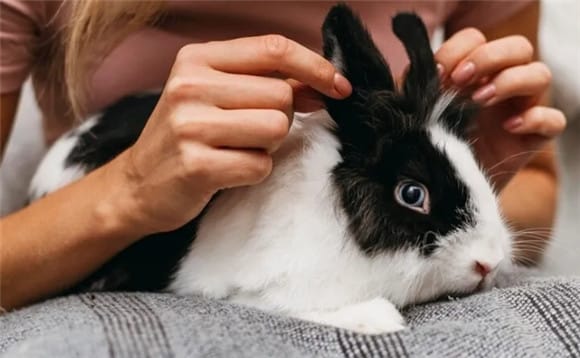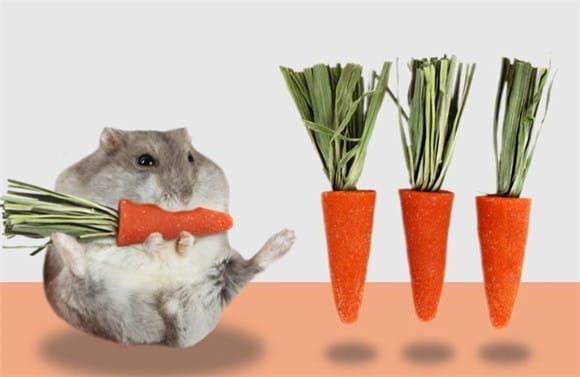Rabbits generally have 28 teeth, including 4 incisors (long teeth) and 22 molars. The incisors are located at the front of the mouth and are used to cut food; the molars are located at the back of the mouth and are used to grind food. Rabbit teeth are constantly growing and require regular grinding to maintain their health and normal length.

1. The specific classification and functions of rabbit teeth
1. There are 4 incisors (long teeth) in total
A rabbit’s incisors, also called long teeth, are one of the most prominent dental features in its mouth. They are located on the rabbit's upper and lower jaws, with two incisors on each jaw. These incisors play an important role in the life of rabbits, and their specific functions and functions are as follows.
Cutting food: Rabbit’s incisors are very sharp and suitable for cutting various foods. When rabbits eat grass, vegetables or other food, they use their incisors to cut the food into small pieces suitable for chewing in preparation for subsequent digestion.
Chew on hard objects: Rabbits’ incisors grow very quickly, so they need to constantly chew on hard objects to shorten their incisors to prevent excessive length and abnormal growth. Not only does this gnawing behavior help maintain the length and shape of the incisors, it also exercises your rabbit’s jaw muscles and satisfies their natural urge to gnaw.
Defense and self-defense: Although rabbits’ incisors are mainly used for food acquisition and chewing, they can also use their incisors to bite when they are in danger or need to defend themselves. In the wild, rabbits may use their incisors to defend themselves against predators or engage in territorial fights with other rabbits.
In general, a rabbit’s incisors are not only indispensable tools in its daily life, used for cutting food and biting hard objects, but also have defense and self-defense functions. Therefore, maintaining healthy growth and regular trimming of your rabbit's incisors is an important part of rabbit health management.
2. A total of 22 molars
The composition of the rabbit’s 22 molars is as follows. Ten premolars: 6 upper premolars and 4 lower premolars. Twelve rear molars: 6 upper rear molars and 6 lower rear molars.
Rabbit’s molars play an important role in the process of food digestion. Their main function is to grind and chew food so that it becomes easily digestible. Rabbits are herbivores and their food is mainly grass, leaves and other plant foods, which need to be thoroughly ground to be absorbed by the rabbit's digestive system. The design and arrangement of molars allow rabbits to efficiently grind food into small, easily digestible pellets. Molars also help rabbits control their food intake, as they take more time and effort to chew hard foods. Rabbit molars usually grow continuously, which ensures that they are always the proper length and shape to grind food efficiently.
3. Canine teeth
The canine teeth of rabbits are usually very small and sometimes cannot even be seen. They are located on the sides of the incisors and are not as obvious as in other animals.

2. The necessity of rabbit teeth grinding
< p> Since rabbit teeth will continue to grow, about 0.2-0.3 mm per day, if the teeth are not ground in time, the teeth will become too long, resulting in abnormal bite, and even affecting eating and health. Therefore, it is very important to help rabbits grind their teeth, which can be achieved by providing suitable chewable food, toys, or regular dental inspection and trimming. This will keep your rabbit's teeth healthy and avoid other health problems that can result from dental problems.3. How to help rabbits grind their teeth
1) Provide suitable food: Provide rabbits with hard food that needs to be chewed, such as hay, fresh vegetables and fruits. These foods can Promote chewing activities of rabbits and help grind teeth.
2) Provide appropriate chewing toys: Provide rabbits with toys suitable for chewing, such as wooden toys, hard plastic toys or rabbit-specific chewing balls. These toys can allow rabbits to exercise their teeth and enrich their daily life. way of life.
3) Regular dental check-ups and trimming: Take rabbits to the veterinarian regularly to check their teeth to ensure their teeth are healthy. If your rabbit's teeth are too long or abnormal, your veterinarian can help trim the teeth to maintain their normal length and shape.

 扫一扫微信交流
扫一扫微信交流
发布评论